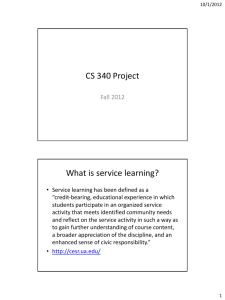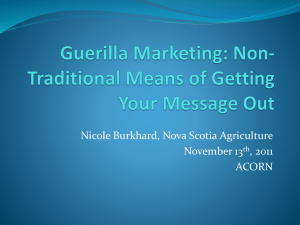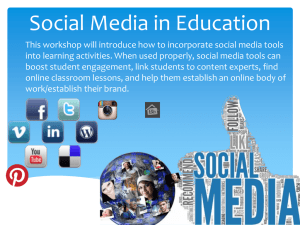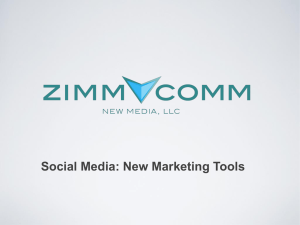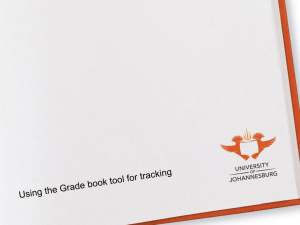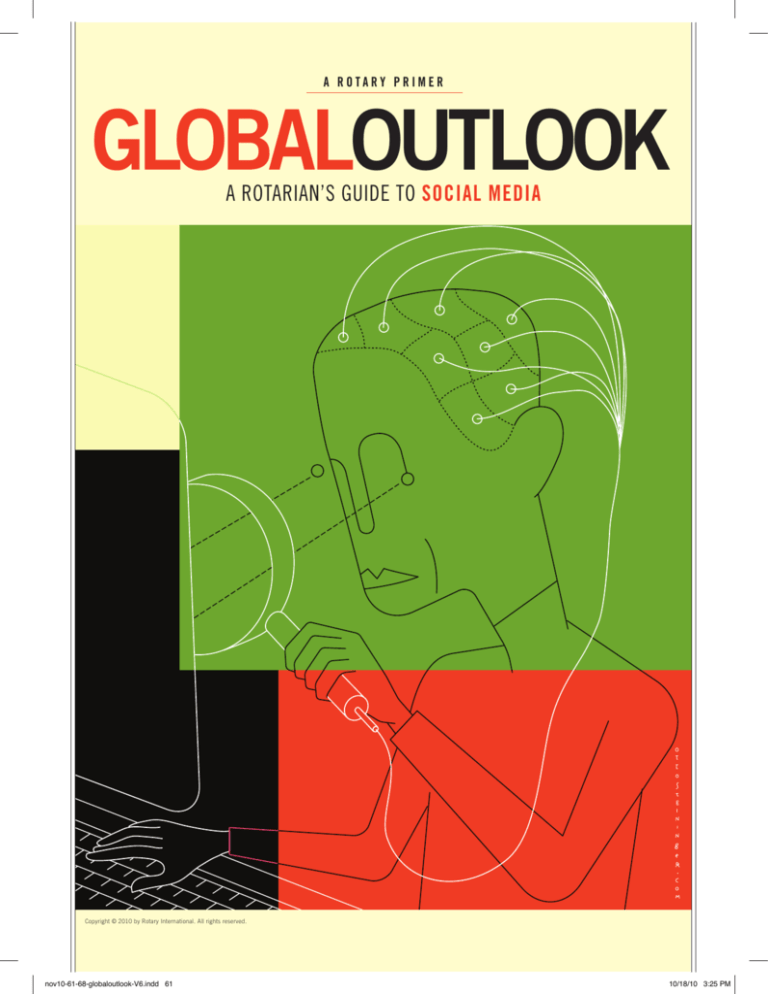
a rotary primer
globaloutlook
a rotarian’s guide to social media
Copyright © 2010 by Rotary International. All rights reserved.
nov10-61-68-globaloutlook-V6.indd 61
10/18/10 3:25 PM
tHe social media landscape
SOCIAL
MICROSOCIAL
MICRONETWORKING
BLOGGING
NETWORKING
BLOGGING
social
netWorking
What it
involves
blogging
blogging
netWorking
bookmarking
Posting
video,
photos,
and music.
Publishing
news or
keeping an
online journal
or diary.
Broadcasting short
messages to
other users or
subscribers.
Connecting
with other
professionals.
Organizing
and sharing
your favorite
web pages
and sites.
Facebook
33.4%
YouTube
24.1%
Blogger
11.6%
Twitter
7.1%
LinkedIn
2.5%
Digg
0.8%
Hi5
Kaixin001
Mixi
MySpace
Orkut
QQ/Qzone
VKontakte
Dailymotion
Flickr
Ku6
Megavideo
Photobucket
Tudou
Youku
Ameba
Blogfa
LiveJournal
Mihan Blog
Seesaa
TypePad
WordPress
Digu
FriendFeed
Identi.ca
Jaiku
Plurk
Tumblr
Yammer
APSense
Biznik
Ecademy
Fast Pitch
Focus
Ryze
XING
Delicious
Diigo
Mister Wong
Mixx
Propeller
Reddit
StumbleUpon
You can
post status
updates, share
photos, and
chat all in
one place.
Visual media
can appeal
to a wide
audience.
You can
create your
own mini
website in
minutes.
Creating short
messages
doesn’t take
a lot of time.
Creating an
online network
may generate
new business
leads.
You can
access a list
of your favorite
websites from
anywhere.
Privacy
settings can
be complex.
Users need to
be aware of
copyright laws.
Regularly
updating a
blog requires
commitment.
Irrelevant
chatter, or
“noise,” can
be frustrating.
Users may feel
pressure to
share sensitive
information.
Using tags,
or keywords,
may be
confusing.
Add Rotarian
to your profile.
Post photos
or videos
of a service
project.
Share your
club’s news
on a blog.
Send brief
reminders
about Rotary
events.
Find someone
in your network
to invite to a
Rotary event.
Click the
Share button
on an RI
News story.
other
leading
sites
advantage
disadvantage
sHaring
MEDIA
B
SOCIAL
SHARING
NE
BOOKMARKING
Connecting
with friends
and family
online.
World leader
by % of
all internet
users who visit
the site*
How to
promote
rotary
MEDIA
BUSINESS
SOCIAL
MICROBLOGGING
SOCIAL
BLOGGING
SOCIAL
MEDIA
BUSINESS
MEDIA
BUSINESS
SOCIAL
MICROBLOGGING
SOCIAL
MEDIA
BUSINESS
BLOGGING
SOCIAL
MEDIA
BUSINESS
SOCIAL
SHARING
NETWORKING
BOOKMARKING
BLOGGING
NETWORKING
NETWORKING
SHARING
NETWORKING
BOOKMARKING
SHARING
NETWORKING
BOOKMARKING
BLOGGING
NETWORKING
SHARING
NETWORKING
NETWORKING
SHARING
NETWORKING
BOOKMARKING
multimedia
microsocial
business
• • • • • • ILLUSTRATIONS BY OTTO STEININGER
BLOGGING
BLOGGING
* According to Alexa.com’s three-month average as of 13 July.
nov10-61-68-globaloutlook-V6.indd 62
10/18/10 3:25 PM
social media in action
good news
Ramona’s club in Peru
has come to an agreement with a club in
India to build a children’s hospital. Ravi,
a Rotarian in India, is helping her
spread the word through social media.
(1)
(2)
(3)
(4)
(6)
ILLUSTRATIONS BY OTTO STEININGER
(5)
(7)
(1) ramona posts the news on her Facebook page. Her fellow club members are ecstatic, and they look forward to their next meeting. (2) sHe
creates a youtube cHannel with videos she found about the city where the hospital will be built. (3) sHe joins a group about infant mortality on XING and finds an expert to speak at an upcoming fundraiser. (4) on tWitter, sHe tWeets a message about the fundraiser with a link to her YouTube channel. (5) Her district governor retWeets the message. A club in her district watches the YouTube videos at its next meeting and is moved. (6) tHe Fundraiser is a success. Ramona collects attendees’ e-mail addresses and sends them a link to the blog Ravi has started. (7) ravi keeps
a blog to show the progress on the hospital. Once the hospital is complete, He Will use tHe blog as a resource for his club’s next project.
nov10-61-68-globaloutlook-V6.indd 63
10/18/10 3:25 PM
it would be easy to write
off Facebook, Twitter, and
YouTube as websites that help
people goof off – but you’d
have to ignore the millions
of dollars that humanitarian
organizations have raised using
social media, and the millions of
people whom social networks
touch every day. Though you
might not think of them as
serious communication tools,
social media sites have proved
to be a powerful force for doing
good in the world:They’re free,
and they spread information
faster and to more people than by ben parr
any other mode of communication in history. The newspaper, telegraph, telephone, and e-mail don’t even come close.
In early 2009,Twitter users coordinated a one-day worldwide
fundraiser to support Charity: Water, a nonprofit organization
dedicated to bringing clean and safe drinking water to developing
nations. The offline festival, called a Twestival, was planned in
less than a month and brought together more than 10,000
attendees in over 200 cities, raising more than US$250,000.
This year, Twestival participants in 45 countries upped the
ante, bringing in more than $450,000 for another charity,
Concern Worldwide. The event marked a watershed moment
for fundraising and international service programs, showing that
social media have the power to rally support for humanitarian
causes in a short time.
Earlier this year, when a 7.0 magnitude earthquake devastated
Haiti, killing over 200,000 people and leaving another million
homeless, social media users spread news of the disaster and
mobilized aid. Minutes after the quake struck, shocking images
of the aftermath flooded Facebook and Twitter. It wasn’t long until
contributions began pouring into the relief effort. Social media
great
moments
in social
media
messages tHat
cHanged History
nov10-61-68-globaloutlook-V6.indd 64
and a text-to-donate campaign helped the Red Cross raise over
$396 million in less than three months.
Web users caught in political turmoil have also found
support through social media. In June 2009, when incumbent
Mahmoud Ahmadinejad beat Mir Hossein Mousavi in the Iranian
presidential elections, doubts over the authenticity of the election
results escalated into demonstrations that flooded the streets.
Protesters who wanted to communicate with each other and
spread their message to the rest of the world turned to social
networking sites. Iranians sent status updates through Twitter
about what was happening on the ground and posted videos on
YouTube and photos on Flickr immediately after taking them.
The outcome was historic: Social media broke news faster than
major news networks.
The most powerful moment of the Iranian election crisis came
from a 40-second YouTube video of Neda Agha-Soltan’s last
moments of life after she was shot in the chest at an antigovernment
demonstration. The footage moved viewers worldwide and
refocused global attention on the bloodshed in Iran.
Social media have been as instrumental in telling tales of heroism
as they have of tragedy.When Captain Chesley “Sully” Sullenberger
saved 155 passengers and crew by landing a disabled commercial
airliner, US Airways Flight 1549, in New York City’s Hudson River
in early 2009, the story of “the miracle on the Hudson” unfolded
through social networks. Janis Krums, an eyewitness, published
the first picture of the landing after capturing the image on his
iPhone and posting it to Twitter. The photo became recognized
worldwide as both a record of the first moments of the event and
as proof of social media’s rapid, powerful reach.
International and government agencies have also discovered
the utility of social media in times of crisis. Last year, as the
world began to panic about the spread of the H1N1 virus (swine
flu), many feared it would become the worst pandemic since
the Spanish flu of 1918. At the peak of concern, Twitter users
sent tens of thousands of messages about swine flu every hour.
Agencies such as the World Health Organization and the U.S.
Centers for Disease Control and Prevention responded by using
Facebook, Flickr,YouTube, MySpace, and podcasts to disseminate
up-to-date information on H1N1. WHO and CDC are also
using HealthMap (www.healthmap.org) – a popular tool that
aggregates disease outbreak data in several languages from around
the Web, including from social media sites – to map swine flu
cases throughout the world.
Although the swine flu outbreak ended up being no more
lethal than that of the average flu virus, the event demonstrated
how far social media have come in distributing information
at critical moments. Social media help us learn, respond,
educate others, and raise funds faster and more effectively than
ever before.
10/18/10 3:25 PM
social networking can help you connect with distant friends
or gather with others in the real world. But small details that you
give away – your location, the causes you support, even your favorite movies – could have serious implications if a burglar, strongarm government, or prospective client got hold of them.
If you think you’re sharing this information only with friends,
you might be mistaken. Over the past decade, social networking
sites have deliberately and accidentally released private data. The
biggest threats come from companies that share or leak your information in ways you may not understand or approve of.
Facebook (www.facebook.com) has made several high-profile
privacy mistakes. In 2006, it began publishing users’ actions, such
as the groups they’d joined, to public news feeds. The surprise
change made people reluctant to connect with support groups and
other organizations. “We really messed this one up,” said Mark
Zuckerberg, Facebook founder, in his open apology letter.
In late 2009, the company settled a class-action lawsuit over its
Beacon technology, which tracked some users’ off-site purchases and
published the transactions on Facebook.Then, earlier this year, Facebook changed people’s account settings to make more of their content public, requiring them to take action to restore their privacy.
Service bugs could also put your personal information in danger.
In 2008, Bebo (www.bebo.com) granted several New Zealand users
full control of other individuals’ accounts, allowing them to view,
copy, and modify details that hadn’t been publicly released.
One of China’s largest social networking sites, Qzone (www
.qzone.qq.com), and other Tencent QQ-related services have faced
government pressure that could jeopardize users’ privacy. In 2005,
officials demanded that Shenzhen-based Tencent collect the real names
of members who founded and administered virtual groups, but the
company didn’t follow through. Still, the Chinese government has
continued to push against anonymity, so private information shared
on social networks might one day appear in a government report.
Location-based services present another threat. Sites such as Loopt
(www.loopt.com) and Foursquare (www.foursquare.com) help you
find the location of friends through GPS, and this data often is publicly recorded. Did you walk in a protest or call in sick to work to
take your child to the zoo? Strangers might see those details, depending on your privacy settings. PleaseRobMe.com used location data
from Twitter (www.twitter.com) to show how users compromise
their security by broadcasting
that they aren’t home.
A latecomer to social networking, Google tried to
make up ground – and overreached – when it launched
Buzz (www.google.com
/buzz) in the beginning of this
year. Leveraging users’ Gmail
data, Buzz automatically created social networks based on
frequently e-mailed contacts
and made these contact names
public, no matter who they belonged to: a best friend, divorce
attorney, or psychologist.
by Zack stern Google soon changed the settings of these networks because of public backlash.
The upside to these cautionary examples is that the world is
becoming aware of how websites use information. “People are
having a thoughtful debate and discussion about what privacy is
and what they want,” says Rebecca Jeschke, media relations director
of the Electronic Frontier Foundation (www.eff.org). It remains to
be seen if social networks are listening.
social
networks
risk your
privacy
beWare oF
WHat you sHare
stay safe witH social media
To get the most out of
social media sites without
sacrificing your privacy,
keep these tips in mind:
• Revisit your privacy settings.
Social networks sometimes
change settings and opt you
nov10-61-68-globaloutlook-V6.indd 65
in or out of services without
your permission. Visit your
account settings page each
month to look for changes.
• Protect your account login.
Use a unique password
when you register for any
social media service. If
the service is hacked or your
password is stolen, your
other online accounts won’t
be compromised.
• Take a second look at the
terms of service. These rules
identify what social networks
can do with your information.
Learn about updates to
major sites’ terms of service
at www.tosback.org.
• Think before you post.
Carefully consider the text,
photos, and videos and
who might see them:
clients, peers, or
governments. Even socialnetworking games and
quizzes could send your
data to marketers.
10/18/10 3:25 PM
World 2.0
favorite social media
by geograpHic area
top Four social media sites in selected areas
argentina
● Facebook
● YouTube
● Taringa
● Blogger
australia
● Facebook
● YouTube
● Blogger
● Twitter
austria
● Facebook
● YouTube
● Blogger
● Twitter
bangladesh
● Facebook
● Blogger
● YouTube
● Somewhere in Blog
belgium
● Facebook
● YouTube
● Blogger
● Netlog
brazil
● Orkut
● YouTube
● Blogger
● Twitter
bulgaria
● Facebook
● YouTube
● Vbox7
● Blogger
Canada
● Facebook
● YouTube
● Twitter
● Blogger
Chile
● Facebook
● YouTube
● Blogger
● Taringa
China
● QQ/Qzone
● Youku
● Tudou
● Ku6
Colombia
● Facebook
● YouTube
● Blogger
● Taringa
CzeCh republiC
● Facebook
● YouTube
● Lidé
● Stream.cz
denmark
● Facebook
● YouTube
● Blogger
● Twitter
egypt
● Facebook
● YouTube
● Blogger
● Twitter
Finland
● Facebook
● YouTube
● Blogger
● Suomi24
FranCe
● Facebook
● YouTube
● Dailymotion
● Blogger
germany
● Facebook
● YouTube
● Twitter
● XING
india
● Facebook
● YouTube
● Blogger
● Orkut
iran
● Blogfa
● Mihan Blog
● Cloob
● Blogger
italy
● Facebook
● YouTube
● Blogger
● WordPress
Japan
● YouTube
● Ameba
● Mixi
● Twitter
korea
● Facebook
● YouTube
● Cyworld
● Blogger
mexiCo
● YouTube
● Facebook
● Blogger
● Taringa
mongolia
● YouTube
● Facebook
● Hi5
● Blogger
According to Alexa.com’s one-month traffic rankings as of 13 July. White areas represent places for which data was unavailable.
nov10-61-68-globaloutlook-V6.indd 66
10/18/10 3:25 PM
MICROBLOGGING
MICROBLOGGING
BLOGGING
BLOGGING
SOCIAL
NETWORKING
MICROBLOGGING
MICROBLOGGING
nepal
● Facebook
● YouTube
● Blogger
● Twitter
the netherlands
● YouTube
● Hyves.nl
● Facebook
● Twitter
new zealand
● Facebook
● YouTube
● Blogger
● Twitter
nigeria
● Facebook
● Blogger
● YouTube
● Twitter
MICROnorway
BLOGGING
● Facebook
nov10-61-68-globaloutlook-V6.indd 67
● YouTube
● Blogger
● Twitter
pakistan
● Facebook
● YouTube
● Blogger
● Twitter
peru
● YouTube
● Facebook
● Blogger
● Hi5
philippines
● Facebook
● YouTube
● Blogger
● Friendster
BLOGGING
poland
BLOGGING
SOCIAL
NETWORKING
MEDIA
SHARING
SOCIAL
NETWORKING
MEDIA
SHARING
MEDIA
SHARING
BUSINES
NETWORKI
BLOGGING
SOCIAL
NETWORKI
MICROBLOGGING
BLOGGIN
BUSINESS
NETWORKING
SOCIAL
BOOKMARK
SOCIAL
MEDIA switzerland
BUSINESSunited kingdom
SOCIAL
saudi arabia
NETWORKING
SHARING● Facebook
NETWORKING
BOOKMARKING
● YouTube
● Facebook
● YouTube
● Facebook
● Nasza-klasa.pl
● Blogger
portugal
● Facebook
● YouTube
● Blogger
● Hi5
romania
● YouTube
● Facebook
● Hi5
● Blogger
russia
● VKontakte
● Odnoklassniki.ru
● YouTube
● LiveJournal
● Facebook
● Blogger
● Netlog
south aFriCa
● Facebook
● YouTube
● Twitter
● Blogger
spain
● Facebook
● YouTube
● Blogger
● Tuenti
sweden
● Facebook
● YouTube
● Blogger
● Twitter
● YouTube
● Blogger
● Twitter
taiwan
● Wretch.cc
● Facebook
● YouTube
● Pixnet.net
thailand
● Facebook
● YouTube
● Hi5
● Blogger
turkey
● Facebook
● YouTube
● Blogger
● Izlesene
● YouTube
● Twitter
● Blogger
united states
● Facebook
● YouTube
● Twitter
● Blogger
uruguay
● Facebook
● YouTube
● Blogger
● Taringa
Venezuela
● Facebook
● YouTube
● Blogger
● Twitter
10/18/10 3:25 PM
tHe
social
media
glossary
by megan Ferringer
A
@:
In microblogging and social networking, a symbol placed before a username to mention or reply to a user. For example, on Twitter, adding @Rotary to the beginning of your tweet shows that you are speaking to or about Rotary International.
archive: A historical collection of articles or posts, usually on a blog or news website, organized by date or category. View the RI News archive at www.rotary.org.
B
block:
To prohibit someone from sending you messages or viewing your profile or other information on a social network.
blogroll: A list of recommended blogs or web pages, usually about a similar topic or topics.
D
dashboard:
A control panel or interface, such as on a blog, that allows you to manage your media and settings.
E
embed:
To display a video or photo from another site by adding a line of code to your web page.
nov10-61-68-globaloutlook-V6.indd 68
F
feed:
A constantly updated stream of information delivered at regular intervals. Subscribe to the RI News feed at www.rotary.org.
follow: To subscribe to a microblog feed, such as on Twitter. Follow Rotary at www.twitter.com/rotary.
friend (noun): A person who has agreed to connect with you on a social network.
friend/unfriend (verb):
To add someone to or delete someone from your social network. G
geotag:
multimedia: Online content that incorporates several forms of media, such as photos, video, audio, and text.
N
notification:
A short, automated message informing you of an action you or a friend has taken. For example, on Facebook, you may receive a notification each time a friend posts an update or uploads photos.
P
permalink:
A unique hyperlink to a blog post or article that continues to work even if the page is moved or archived.
plug-in: Software added To add location information in the form of metadata or tags. For example, on Flickr, you may identify your photos with the location where you took them.
to an application to perform special tasks.
H
hashtag (#):
set of preferences you control to determine how a website uses the information you share.
A symbol that allows you to tag, or categorize, your microblog posts. On Twitter, using #Rotary marks your tweets as Rotary related. Searching Twitter for #Rotary yields all Rotary-related tweets.
hits: The number of times people have visited a website or web page.
L
link (or hyperlink):
A web reference that allows you to navigate to another web page by clicking on text or a graphic.
M
metadata:
Information such as a tag, descrip- tion, or caption attached to a photo, video, blog post, or other media. status: A short description of what you’re doing right now. syndication: A method of delivering online content from blogs and news sites to another website or web user. Really Simple Syndication (RSS) allows users to subscribe to news and blog feeds.
T
tag:
To add keywords to a bookmark, video, photo, or blog post to help users search for media by topic.
trackback: In blogging, a way to link a post to a comment or response published on another blog.
tweet: On Twitter, a mes-
sage of 140 characters or fewer published to a feed.
post: An article, message, tweetup: An organized, in-person gathering of people who use Twitter.
privacy settings: A U
username:
or entry published on a blog or social networking site.
profile: An online representation of some- one’s personal identity. On Facebook, you must be a person, not a busi- ness or organization, to have a profile.
R
retweet:
On Twitter, to repeat, or repost, a tweet by typing RT @ plus the original author’s username and message.
S
short URL:
A condensed web address for use in microblogging and other social media. Web sites like Tiny.cc and Bit.ly can shorten a long hyperlink to a few characters.
The name, or user ID, you use to log in to a website and identify yourself to others. On Twitter, RI’s username is Rotary.
V
viral:
Spreading quickly throughout the Internet. Popular phrases, ideas, photos, and videos can travel rapidly from user to user through links, parodies, and reposting.
W
wall:
On Facebook, a feed of a user’s latest activities displayed on his or her profile page.
8
ConneCt with Rotary
International and The Rotary
Foundation on Facebook,
Twitter, LinkedIn, and more.
Visit www.rotary.org
/socialnetworks.
10/18/10 3:25 PM


